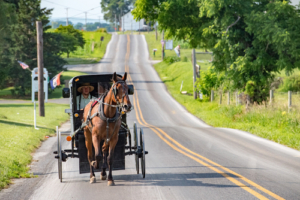The Amish Community and the Struggle Against Government Overreach During COVID-19

The COVID-19 pandemic revealed the resilience of various communities, but it also exposed troubling governmental practices, especially concerning marginalized groups like the Amish. With a remarkably low incidence of COVID-19 infections and other diseases common in modern society, you’d expect this traditional community to be a low-risk group. However, the Canadian government took a rather aggressive stance against the Amish, targeting them for non-compliance with pandemic regulations.
The Clash of Compliance and Culture
In Ontario, more than 30 Amish communities faced hefty individual fines for failing to adhere to the federally mandated ArriveCAN app—an application meant for cross-border travel during the pandemic. Individual fines soared as high as $20,000, piling up to an alarming $300,000 across these communities. This penalty didn’t just feel unfair; it strikes at the heart of their way of life. Without modern conveniences like electricity or smartphones, compliance with governmental regulations became an impossible task.
The real question here is: why target a community that poses no threat? The actions taken against the Amish seem less about public health and more about governmental control and authority. By imposing fines and liens on their farms, the government not only threatened their livelihood but also placed severe restrictions on their ability to secure loans for essential farm equipment. This bureaucratic overreach destabilized their agricultural practices, which are vital for sustaining their communities.
Paradox of Tolerance
In a society that preaches tolerance and respect for diverse cultures and religions, the plight of the Amish raises some serious contradictions. Politicians often advocate for marginalized groups, yet the reality remains that when a community lacks significant political leverage—the Amish not being large voters—they become easy targets for punitive measures. This is a flawed approach, especially when it comes to a community that protects its cultural heritage and has so little impact on public health concerns.

Legal Battles and Emerging Support
Founded in 2021, The Democracy Fund (TDF) has stepped into this struggle, offering critical legal support to the Amish. Mark Joseph, TDF’s Litigation Director, took a stand, affirming, “We are committed to defending the rights of the Amish community.” Recent victories in lawsuits underscore the unique vulnerabilities faced by this community when navigating modern legal systems.
By lifting liens against affected families, TDF is providing a lifeline to these individuals, enabling them to not only sustain but thrive while maintaining their long-held traditions. The organization also offers free legal services to those impacted, a necessary resource for a group facing increased legal obstacles.
The Echoes of Past Actions
Canadian Prime Minister Justin Trudeau’s comments labeling vaccine opponents as “misogynistic and racist” have raised eyebrows but also shed light on a troubling pattern of alienation. This rhetoric coincides with actions taken against communities that lack political clout. As the world moves on from the pandemic, many marginalized groups are still grappling with the long-lasting repercussions of COVID policies.
At Extreme Investor Network, we believe in the power of community, resilience, and self-determination. As the Amish experience highlights, some communities are left vulnerable not just to health crises but to the overreach of governance—underscoring the necessity for legal frameworks that respect cultural diversity, autonomy, and fundamental rights.
Conclusion
The Amish community serves as a poignant reminder of the intersections between culture, governance, and individual rights. Their ongoing struggle emphasizes the need for a more compassionate approach to policy, especially during crises. At Extreme Investor Network, we are committed to fostering dialogue around these issues, advocating for communities that often find themselves at the margins.
Would you like to stay updated on the ongoing developments impacting marginalized communities during and after the pandemic? Join our network for the latest insights in economics, community resilience, and civil rights discussions.

